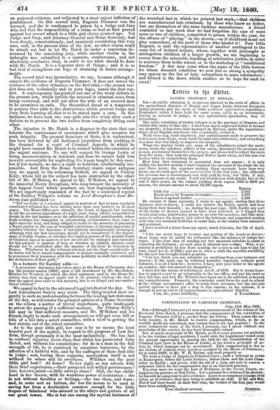!Mug tu t Mutat..
LANDED PROPERTY IN BENGAL.
Sra—As public attention is at present directed to the state of affairs in the agricultural districts of Bengal and Upper India, between European indigo-planters, and the ryots or little practical information regarding a Zemindarii which I have held for some years, solely as an investment, having no interest in indigo, or any agricultural speculation, may be interesting.
The estate consisting of twelve villages is in the province of Itenares, and within fifty miles of that city ; it had been much neglected before it became my property; it has since been managed by Natives, under the superinten- dence of an English merchant, who occasionally visited it.
Wells were dug, roads improved, and embankments made to preserve the cultivation from floods, waste lands brought into cultivation, and everything was done that was likely to improve the property.
When the mutiny broke out, some of the inhabitants joined the muti- neers, burnt the cutchory (office) of the estate, plundered the accounts and money, proclaimed themselves the owners, and proceeded to collect the rents from the ryots; they took the principal Native agent away, and his arm was broken when he escaped from them.
How long they remained in possession does not appear ; it is only within the last few months I have obtained the accounts of the estate for the past three years ; the expenses making these accounts have been very great, one-seventh part of the nominal rent of the first year ; for, although the revenue due to Orovernment was duly paid by each., but little, if any, surplus appears at my credit. I will not trouble you with details, but at the end of three years, on the estates yielding from rupees 7000 or 8000 per annum, the arrears amount to about 10,500 rupees.
Rupees. Cash due 2,432
Bonds given by Tenants for banker 5,079
Decrees against banker • 2,426
On receipt of thew accounts, I wrote to my agents, stating that these balances were so heavy, I could not believe the Native agents had been doing their duty honestly ; as, during the past year, 1859, hardly any part of the bonds or decrees seemed to have been collected, so I begged they would send some trustworthy person to go over the accounts, and take mea- sures to enforce the decrees, and collect the balances, and suggested sending with him two mounted Orderlies to assist him, as the estates were extensive and scattered.
I have
1860. received a letter from my agent, dated Calcutta, the 7th of April, "I for one never hope to recover any portion of the bonds or deerees; these items may be useful for influences like the balances of indigo fac- tories. I like your idea of sending out two mounted orderlies to assist in collecting the balances ; no such plan is allowed now-a-days. Why, a ze- mindar is prohibited by law from sending for a ryot to ask him to pay his rent, (read Act X. of 18590 and see to what a state the maudlin sensibility for the ryot has brought landed property.
"I do not think you can calculate on anything from your balances and decrees ; if the rents can be collected hereafter regularly without great balances, it is all I look for ; however, I have sent your letter to the agents up country, who will answer for themselves." I have not the means of referring to Act X. of 1859. But it seems hope- less to expect a ryot to go voluntarily to the tax-office, and pay his rents as they fall due, and how Mr. Wilson's new taxes are to be collected, is beyond my comprehension. Formerly, the zemindar could force the ryot to attend at the village accountant's office to settle their accounts, but the Act just quoted appears to have put a stop to this custom ; in my opinion, it is enough to put an end to all improvements in agricultural districts.


























 Previous page
Previous page